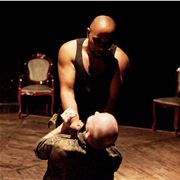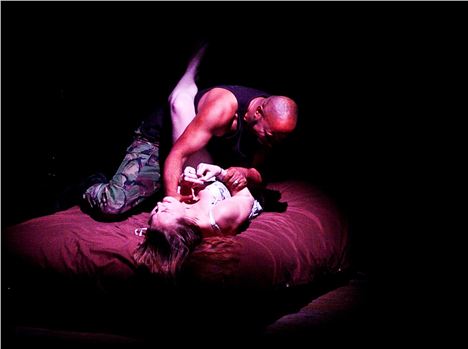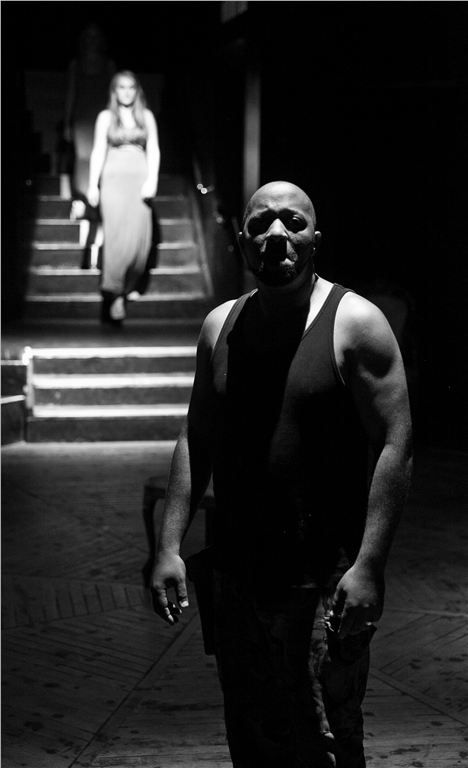TO be honest, the Kaz is very much off most people’s radar when it comes to theatre, let alone the other events and gigs which have found a great venue there.
It’s a stone’s throw from the big black Nissan hut [aka Cream] down in Wolstenholme Square and wears its alternative credentials with wry pride. It has built up a dedicated following over the years – particularly the annual Improvathon events as Liverpool’s legacy to Ken Campbell’s quite unique way of doing things.
So, when I discovered they were planning to do Shakespeare’s Othello, I was intrigued. Surely, I thought, it’s too small; too intimate a space to do it justice.

The stage area is about the size of a couple of backyards, maybe even less, with narrow staircases on either side leading up to a balcony. The seating is arranged in the round with a maximum capacity of about 70 or so. There’s a top balcony for the musicians on one side, another one to the back for the actors and basically, that’s it. Try and imagine black-painted early Everyman, but singularly compressed, and you’ve got the picture.
Some other notes…Trickster Theatre itself is the creation of Cellan Scott who both directed the play and took on the role of Iago. It’s fast gaining a reputation of becoming the master of fringe Shakespeare and received some very good reviews of its previous production of Macbeth at the Actors Studio. This time around, Othello took three months in the making for an incredibly short run of five nights at the Kaz.
Othello is considered to be the bleakest and darkest of Shakspeare’s plays. It deals with personal feuds, hatred, betrayal, manipulation, jealousy, mistrust and cold-blooded murder to name but a few. Threads running between these are racism, revenge, lust and misplaced loyalty. Yes, all these packed into three hours of intense drama where souls are stripped bare to reveal the worst sides of human nature.
As Cellan says “This is one of the most thrilling and horrifying of Shakespeare's tragedies. Because we all connect with the demon of jealousy, we've all felt it and the power it can have on a relationship, maybe not to the extreme limits of the characters in the story, but we know that twist of jealousies blade the heart”. And that’s only one facet of it.

Othello is a bitter and twisted revenge driven by hate and deception. On the island of Cyprus, Othello, a general in the Venetian army, is celebrating after destroying the Turkish navy as well as marrying Desdemona, daughter of the local dignitary Brabantio. Othello is an African black…a Moor. Iago, Othello’s subordinate, holds a grudge against him, because Othello gave the position of deputy to Cassio who is Iago’s rival. Iago plies Cassio with drink who ends up making an arse of himself. Outraged, Othello dismisses Cassio from his post.
Seizing the opportunity, Iago tells Cassio that he should plead with Desdemona, to try to get reinstated. Conspiratorially, Iago also tells Othello that he should suspect the close relationship between his wife and Cassio and comes up with a Baldrick-style cunning plan. He forces his wife Emilia, Desdemona’s maid, to steal one of Desdemona’s handkerchiefs which, then, gets secretly deposited into Cassio’s house.
Othello sees Cassio holding Desdemona’s handkerchief in his hand. Othello, then, goes through the tortures of suspecting his new wife of betrayal, and makes up his mind to kill her.
That night, Desdemona gets an ominous feeling something terrible is about to happen to her. Othello enters the room, and throttles her before she can swear her innocence. Emilia rushes into the room, and tells Othello that Iago forced her to be a part in his devious plot, and everything is Iago’s deception. But she is far too late. Othello falls into despair of ever seeing his faithful wife again, and he kills himself with a concealed dagger.
Well, that’s the plot. How they managed to achieve it with nothing more for a set than two chairs, a bed, a couple of pistols and daggers hidden within army fatigues is a minor miracle, particularly the fast-paced dialogue which often comes spitting out like semi-automatic gunfire.
The main thrust of the action is well portrayed by Iago [Cellan Scott] whose evil machinations result in seeds of merciless rivalry and eventual gut-wrenching violence. He plays the bad guy throughout and takes no prisoners. Everyone else is left to dangle like puppets on his strings. Othello [Leroy Liburd], on the other hand, comes across as weak and indecisive. He starts off blissfully happy but, gradually, is manipulated through gossip and innuendo to make rash decisions which eventually destroy him. Liburd gets better as the plot develops, particularly when he gets angrier and fraught with mad passion, including the demands for the missing handkerchief which brings on a seizure and epileptic fit. Later, his demonic strangling of a screaming Desdemona [Elena Stephenson] was truly frightening from some ten yards away.
For the major female roles, Stephenson played her part well, portraying the necessary docility and submissiveness with dignity and warmth yet fought her own corner with zeal. Emilia [Hayley McGregor] was a devoted handmaid, both wily and waspish with a whiplash tongue…very much the oracle of truth when it mattered. Shame that she, too, had to be exterminated by Iago’s deadly hand. Finally, Bianca [Elizabeth Donnelly] who was whore personified, strutting about with bruised ego, seductive attitude and unsurprising anger when asked to be a reluctant needleworker.
Supporting roles were played out with characteristic aplomb and brisk detail. Particularly so in Cassio [Jack Darell] who had the unfortunate role as alleged cuckolder and general fall-guy. His bruising fight scene with Roderigo [Gavin Churnin] being pitilessly real ahead of his final promotion. This was, probably, the only satisfactory conclusion of the whole play apart from Othello’s own falling on his sword to balance the books.
Montano [Rob Longson] was a disciplined performance of officer-class execution whilst Brabantio [Paul Robinson] had a subtle mix of gravitas and charm. I was impressed by the versatility of the cast in taking these roles on board as it’s well outside their usual comfort zone. Not only did they manage to fully embrace their characters, but made the most of the spoken word, nuances and physical chemistry in lieu of a minimalist set – ably assisted by haunting sound effects by musicians Simon Knighton, Nick Branton, Michael Metcalfe and Adam Millington.
In conclusion, I think Trickster Theatre created something quite unique in this short run. Yes, it was ambitious, yes, it left you emotionally drained and, yes, you were literally so close to the action that you were eavesdropping in the dark rather than simply watching from afar. It was an epic tragedy in a tiny space with quick-fire lines and realistically-close violence.
Fitting, then, that the closing scene involved yet more self-immolation to add to the body count, with a handcuffed Iago shrieking with swivel-eyed manic laughter as his plans came to eventual fruition.
Much credit, then, to Cellan Scott and Trickster Theatre for having the vision and self-belief to bring this all together whilst trusting in his well-chosen band of fellow actors to deliver the goods. They should all be proud of their combined efforts and collective achievement in extending their range of stagecraft abilities and talent.
8/10
















